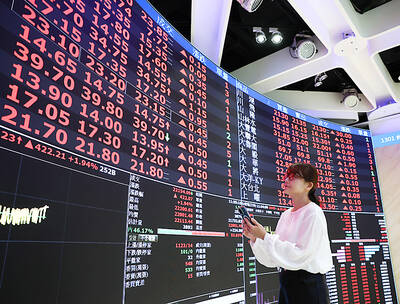The head of Curves International Inc, which operates the world's largest fitness franchise, yesterday set a goal of opening more than 200 locations domestically over the next five years.
"Taiwan is very much like Japan. Women don't like going to gyms because these places are not designed for them. They might get stares from men and feel uncomfortable. Gradually they just give up," Gary Heavin, founder and chief executive officer of Curves, said at a press briefing yesterday.
After entering Japan early last year, the chain expanded to nearly 500 locations and expects to command one-third of the Japanese market by the end of this year, Heavin said.
Curves opened a pilot center in the Tianmu area in March, which has attracted 200 members. Its first franchise will be launched in Taipei in early August near the intersection of Nanjing E Road and Fuxing N Road.
Taking a different approach from most large fitness centers, Curves focuses on women and claims to offer a convenient and efficient workout environment.
With an average size of 45 pings (148.5m2), each location is equipped with basic exercise facilities but does not offer showers, saunas or swimming pools.
Heavin said he was optimistic about gaining a large share of the market because only 2.2 percent of Taiwanese go to gyms, compared with 15 percent in the West.
Candy Tang (唐雅君), chairwoman of Alexander Health Club (亞力山大俱樂部), Taiwan's largest fitness center chain with 20 clubs nationwide and 280,000 members, said competition would stimulate the domestic market.
"Any new business model might have opportunities here as the fitness sector in Taiwan is far from the saturation point," she said in a telephone interview.
She also called on the government to relax regulations on issuing fitness operation licenses in commercial areas to encourage entry of new players in the market.

UNCERTAINTIES: Exports surged 34.1% and private investment grew 7.03% to outpace expectations in the first half, although US tariffs could stall momentum The Chung-Hua Institution for Economic Research (CIER, 中華經濟研究院) yesterday raised its GDP growth forecast to 3.05 percent this year on a robust first-half performance, but warned that US tariff threats and external uncertainty could stall momentum in the second half of the year. “The first half proved exceptionally strong, allowing room for optimism,” CIER president Lien Hsien-ming (連賢明) said. “But the growth momentum may slow moving forward due to US tariffs.” The tariff threat poses definite downside risks, although the scale of the impact remains unclear given the unpredictability of US President Donald Trump’s policies, Lien said. Despite the headwinds, Taiwan is likely

READY TO BUY: Shortly after Nvidia announced the approval, Chinese firms scrambled to order the H20 GPUs, which the company must send to the US government for approval Nvidia Corp chief executive officer Jensen Huang (黃仁勳) late on Monday said the technology giant has won approval from US President Donald Trump’s administration to sell its advanced H20 graphics processing units (GPUs) used to develop artificial intelligence (AI) to China. The news came in a company blog post late on Monday and Huang also spoke about the coup on China’s state-run China Global Television Network in remarks shown on X. “The US government has assured Nvidia that licenses will be granted, and Nvidia hopes to start deliveries soon,” the post said. “Today, I’m announcing that the US government has approved for us

When Lika Megreladze was a child, life in her native western Georgian region of Guria revolved around tea. Her mother worked for decades as a scientist at the Soviet Union’s Institute of Tea and Subtropical Crops in the village of Anaseuli, Georgia, perfecting cultivation methods for a Georgian tea industry that supplied the bulk of the vast communist state’s brews. “When I was a child, this was only my mum’s workplace. Only later I realized that it was something big,” she said. Now, the institute lies abandoned. Yellowed papers are strewn around its decaying corridors, and a statue of Soviet founder Vladimir Lenin

The National Stabilization Fund (NSF, 國安基金) is to continue supporting local shares, as uncertainties in international politics and the economy could affect Taiwanese industries’ global deployment and corporate profits, as well as affect stock movement and investor confidence, the Ministry of Finance said in a statement yesterday. The NT$500 billion (US$17.1 billion) fund would remain active in the stock market as the US’ tariff measures have not yet been fully finalized, which would drive international capital flows and global supply chain restructuring, the ministry said after the a meeting of the fund’s steering committee. Along with ongoing geopolitical risks and an unfavorable